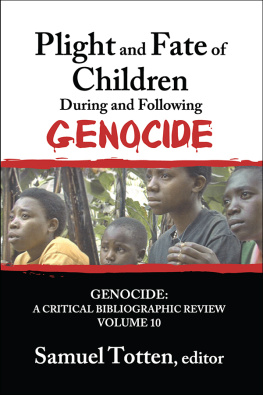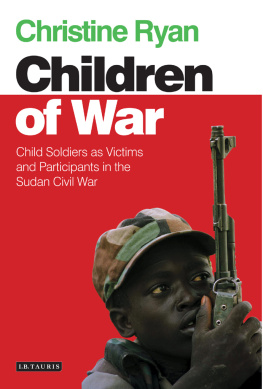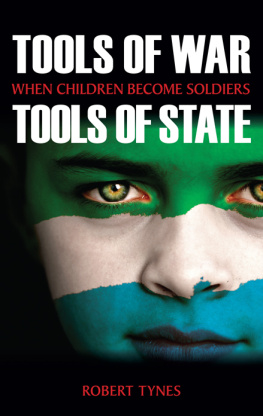Copyright 2006 University of Pennsylvania Press
All rights reserved
Printed in the United States of America on acid-free paper
10 9 8 7 6 5 4 3 2 1
Published by
University of Pennsylvania Press
Philadelphia, Pennsylvania 19104-4112
Library of Congress Cataloging-in-Publication Data
Honwana, Alcinda Manuel.
Child soldiers in Africa / Alcinda Honwana.
p. cm. (The ethnography of political violence)
Includes bibliographical references and index.
ISBN-13: 978-0-8122-3911-9
ISBN-10: 0-8122-3911-3 (cloth : alk. paper)
1. Child soldiersAfrica. 2. Children and warAfrica. 3. Children and violenceAfrica. 4. Political violenceAfrica. I. Title. II. Series.
HQ784.W3H66 2005
355.0083096dc22 2005042436
The issue of childrens participation in armed political conflict has captured the attention of the world during the past ten or fifteen years. Images of boys carrying guns and ammunition flash across television screens and appear on the front pages of newspapers. Less often but equally disturbingly, stories of girls pressed into the service of militias surface in the media. An unprecedented number of children have been drawn into active participation in warfare. Many children are coerced into fighting; others are pushed into it by poverty and crises in their communities; some may be seduced by promises of glory or excitement. Children as young as eight or ten are transformed into merciless killers, committing the most horrendous atrocities with apparent indifference or even pride.
Childrens involvement in armed conflict is not a recent phenomenon. In the past, young people have been at the forefront of political conflict in many parts of the world, even when it has turned violent. Today, however, the problem has grown to such magnitude that it has attracted public notice. What is new is not just the visibility of civil wars but also that children are more deeply involved; in some places, they form a substantial proportion of combatants. Analysts of war have pointed out that most contemporary civil wars represent a total societal crisis. Social order is almost entirely disrupted, and defenseless civilians, especially women, children, and the elderly, are particularly vulnerable.
Reports of children taking human lives are increasingly infiltrating public awareness, not only from conflict zones but also from societies in peacetime. Almost any newspaper or nightly news show in the United States includes a litany of youthful victims and perpetrators of inner-city violence; some cities keep a running tally of the death toll. Isolated cases that occur in white, middle-class settings seem more shocking, such as the Columbine school shootings or the murder of a Dartmouth college couple by two Vermont teenagers. Even younger children can commit murder: for example, three-year-old James Bulger was killed by two ten-year-olds in the United Kingdom. Incidents of children killing children are troubling. The systematic, organized use of children to wage war is even more appalling.
Children get caught up in armed conflict in a whole host of ways. Often, those who manage to avoid becoming soldiers are maimed or killed in attacks on civilian areas. Children are separated from their parents, orphaned, and uprooted from their communities. The displaced may have to seek refuge in other territories. Those children who remain in war zones are subjected to various forms of violence and exploitation. Some are injured by landmines while playing or working. Children are turned into spies or gunrunners, or they work as guards, cooks, cleaners, and servants in military camps. Particularly damaging for future generations is the impact of war on girls. Disadvantaged even in peacetime, girls experience sexual abuse, rape, enslavement, and other tribulations during war. Children witness terrible atrocities and suffer from trauma. Children are deprived of education and basic healthcare. Wars and other forms of armed conflict have profound and lasting effects on young people.
These developments have not gone unnoticed. In recent years, the impact of armed conflict on children has moved to the forefront of political, humanitarian, and academic agendas. The international community has taken several significant steps to address the problem. In 1990, the United Nations established the Convention on the Rights of the Child, which contains important provisions for children affected by armed conflict. In 1994, the UN General Assembly commissioned the Machel study on the impact of armed conflict on children. In 1996, Graa Machel presented a ground-breaking report which made specific recommendations for action. Based on Machels recommendations, the General Assembly created the Office of the Special Representative of the Secretary General for Children and Armed Conflict in 1997. This office was commissioned to raise awareness and promote the collection of information about the plight of children affected by armed conflict as well as to foster international cooperation to promote respect for childrens rights amid such conflicts.
Many humanitarian organizations have launched specific programs to address the issue of children affected by armed conflict and to promote protection and support. The issue became a topic of interest in academic circles as well, producing significant research and publications.
The dramatic shift of social roles and responsibilities of children brought about by war is intrinsically linked to the breakdown of societal
Child soldiers live between a world of make-believea childs world of games and fantasy, of playing with gunsand realitywhere the playful becomes shockingly lethal and the game turns deadly. Here the ludic is transformed into the grotesque and the macabre.
The role-related and ritually defined boundaries between childhood and adulthood that existed in Angola and Mozambique before the onset of civil war were broken down by extreme social crisis. As the social order was disrupted, roles between adults and children were displaced. Children actively create and recreate their roles according to the situations presented to them, and when their communities become engulfed in civil war, they assume roles that under normal circumstances would be filled by adults. In Angola and Mozambique, many children became active soldiers, committing the most horrific atrocities. This dramatic shift is intrinsically linked to the breakdown of societys structures and morality in a crisis such as war.
Outline of Argument
This book focuses on the involvement of children in civil wars in Mozambique and Angola, conveying the experiences of children directly
Although this study is based on field research from these two countries, its scope extends beyond the borders of Mozambique and Angola. Comparative analyses of various cases highlight their similarities and differences as well as offering broader analytical perspectives on the impact of war on children. In sum, this study situates the phenomenon in Mozambique and Angola within the context of a more far-reaching exploration of these issues.
The book makes four main arguments: (1) the involvement of children in war does not constitute a new phenomenon but has gained new dimensions because of changes in the nature of warfare and current understandings of childhood; (2) children affected by conflictboth girls and boysdo not constitute a homogeneous group of helpless victims but exercise an agency of their own, which is shaped by their particular experiences and circumstances; (3) the healing and reintegration of children affected by armed conflict need to be embedded in local world views and meaning systems in order to be effective and sustainable; and (4) social reintegration of children affected by armed conflict must go hand in hand with larger strategies of social development and the eradication of poverty.





